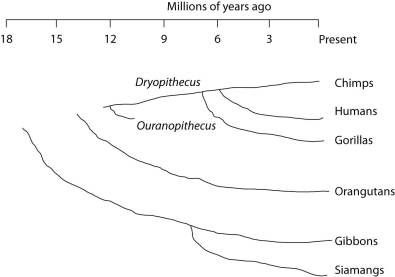Question 43
(Multiple Choice)

Figure 26.5. Humans, chimpanzees, gorillas, and orangutans are members of a clade called the great apes, which shared a common ancestor about 18 million years ago (Figure 26.4). Gibbons and siamangs comprise a clade called the lesser apes. Tree-branch lengths indicate elapsed time.
-The great apes comprise the family Hominidae, whereas the lesser apes comprise the family Hylobatidae. If the extant organisms on the far right side of Figure 26.5 comprise the next-most exclusive (i.e., specific)taxon, then they comprise different
A) subspecies.
B) species.
C) genuses.
D) genera.
E) orders.
Answer